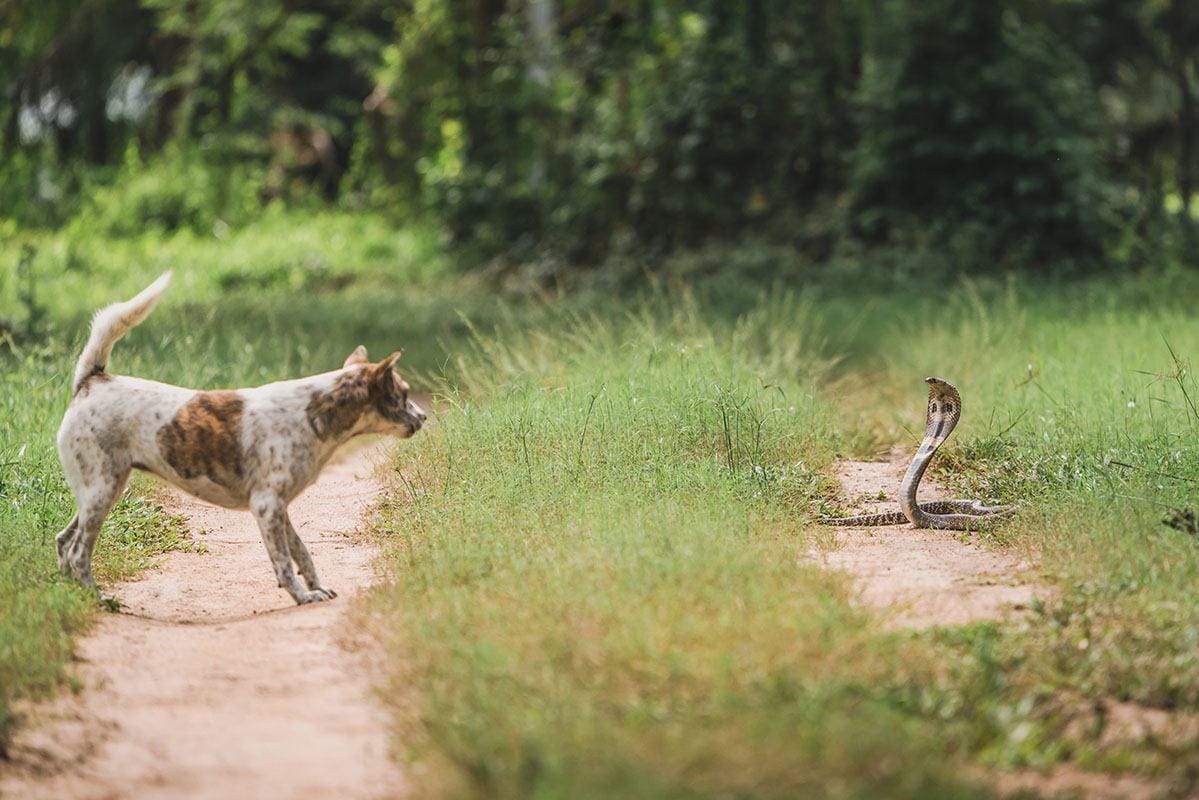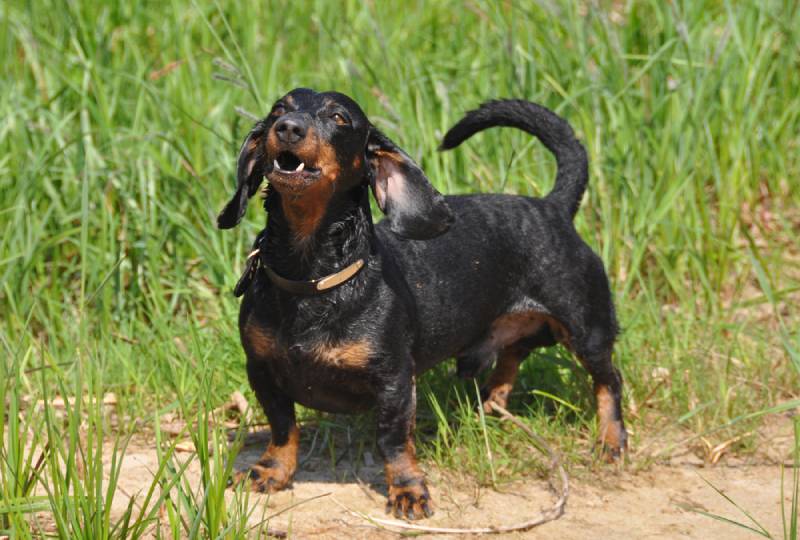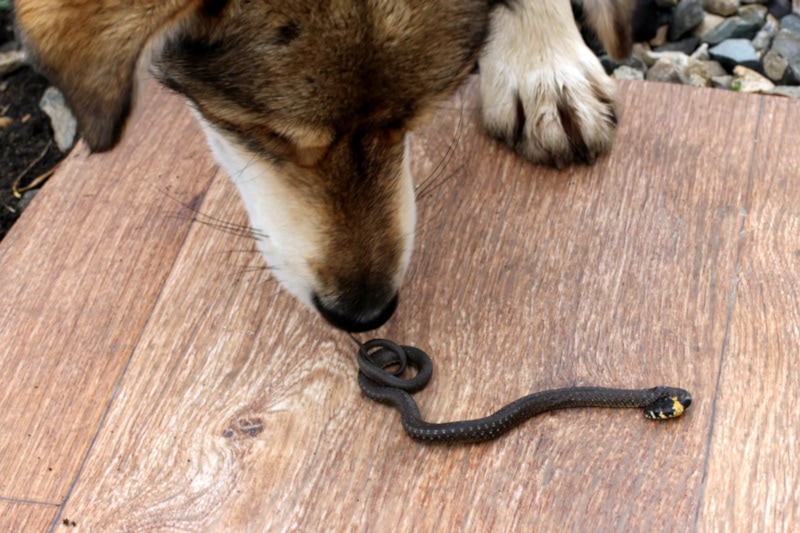Dogs can smell snakes and other reptiles. They may even be able to tell the difference between venomous and nonvenomous reptiles based on their scent. Their amazing nose allows them to pick up on places snakes used to be, too. For instance, they can smell snake skins and musk (a defensive mechanism snakes produce to deter predators).
However, that doesn’t mean dogs won’t get bitten. Some dogs may be able to smell a snake but may have no idea what a snake is. If your dog has never encountered a snake, it’s very possible that they may not know what produces the smell.
Dogs can be curious, too. They may smell the snake and then try to investigate, leading to them being bitten. Therefore, you shouldn’t trust your dog’s nose to keep them away from a snake.
How to Keep Dogs Away From Snakes
There are several ways to keep your dog away from snakes. The most straightforward option is to avoid snakes in the first place. Don’t go places with your dog where snakes may be, such as tall grass, rocks, and ledges. Water snakes often hang out in marshy areas, too. Keep your dog leashed and supervised outside.
You can teach your dog to stay away from snakes. However, this is a long process and requires you to seek out snake skins and musk (as a training tool). Many people do not have access to these items. Plus, you’ll have to use the skins and musk of the particular species near you.
Therefore, many people decide to take an easier path by simply keeping their dogs away from where snakes may be. However, if you’re especially worried about your dog getting bitten, we recommend training them to avoid snakes.

Signs of Snake Bites in Dogs
In the worst-case scenario, your dog may wander up on a snake despite being able to smell them. They may get bitten. The exact signs of a snake bite will vary depending on the dog and the snake. Some species are venomous and will cause completely different signs than a species that isn’t venomous. Even different venomous snakes cause differing signs.
- Sudden weakness
- Collapse
- Swollen area
- Puncture wounds
- Bleeding and bruising
- Trembling or shaking
- Dilated pupils
- Excessive drooling
- Quick, shallow breathing
- Vomiting
- Diarrhea
- Bloody urine
If you see any sign of a snake bite, you should see your vet right away. Many snake bites are fatal if venom was injected. Therefore, it’s vital to get the proper treatment.
Signs don’t always show up right away. Sometimes, it may take over 24 hours for the signs of a snake bite to occur and this often confuses dog owners. However, don’t let it keep you from seeing a vet.
If you need to speak with a vet but can’t get to one, head over to PangoVet. It’s an online service where you can talk to a vet online and get the personalized advice you need for your pet — all at an affordable price!
Do Snakes Smell Bad to Dogs?
Dogs aren’t innately attuned to avoid snakes. Therefore, no, snakes probably do not smell bad to dogs. Dogs can learn to identify the particular smell of a snake, especially the skin and musk of the snake. However, dogs aren’t born knowing what this smell is and will not avoid it all the time.
In fact, some dogs smell a snake and go after it. They are curious and may wonder what the snake is, only to get bitten. Only some breeds of dogs may be able to detect snakes without musk, such as beagles and bloodhounds. These dogs have a very attuned sense of smell, which is why they can detect snakes when others cannot.
Do Snakes Stay Away From Dogs?

It depends on the snake, the dog, and the situation. There is no promise that all snakes will stay away from all dogs all the time. It simply depends.
However, snakes do try to avoid dogs, usually. They are larger animals that pose a risk to the snake. Snakes are more likely to stay away from dogs that are loud, large, or active, as they may perceive them as predators.
Dogs may be able to detect snakes by their smell or sound and may try to investigate or chase them out of curiosity or hunting instinct. This can put them at risk of being bitten by a venomous snake, especially if they approach the snake head-on or try to grab it with their mouth. Therefore, even if the snake tries to avoid the dog, the dog may go after the snake.
While the loud, predator-like behaviors of a dog can be scary to snakes, this scariness may make some snakes feel cornered and threatened. These snakes may bite, even if the dog didn’t know it was there. There are few things more dangerous than a hidden snake, and don’t assume snakes won’t bother you just because you have a dog with you.
What Do Dogs Do When They See a Snake?
It depends on the dog. If the dog knows what a snake is, they will react very differently than a dog that doesn’t. Most curious dogs will sniff the snake, which may lead to the snake biting. They may twitch their snout, point their nose in the air, or sniff the ground intensely.
Most of the time, their change in behavior should let you know that they have seen a snake.
Many dogs will bark, which may scare the snake away. They may also bounce or jump to make themselves seem more predatory, which can also be scary for the snake. If the snake turns and leaves, some dogs may chase and attack the snake, which will prompt it to bite. While the dog is doing what he’s supposed to be doing, it can lead to complications.

Final Thoughts
Dogs can often smell snakes, though it depends on the situation and species. However, even if the dog smells the snake, it doesn’t mean that the dog knows what a snake is. In many situations, the dog may be curious and try to sniff the snake, which can result in bites. Therefore, it isn’t a good idea to rely on a dog’s sense of smell to keep them safe from snakes.
It also isn’t a good idea to rely on a dog to keep you safe from snakes. Snakes will not go out of their way to avoid dogs any more than they would a person, and dogs do not notice snakes all the time.
See also:
Featured Image Credit: Inna photographer, Shutterstock













